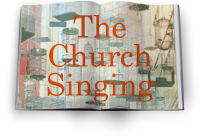Who Should Pick the Music?
“I just want to know who’s in charge?” That sentence brought light to my situation. I had just preached my candidating sermon, and was about to grab a brief lunch before Q&A with the congregation. But instead of eating, the chairman of elders and the interim executive pastor whisked me to a back room for a hastily convened meeting with the pastor of worship. He didn’t beat around the bush but got right to the point:
If I was called as lead pastor, who would decide what happened in the Sunday morning service prior to the sermon? Who would pick the music? Who would determine the order? Who, in short, would be in charge?
It was a reasonable question. He had been responsible for those decisions in the church up to that point, and apparently I had dropped enough hints in my candidacy that he had begun to wonder if things were going to change. And, in fact, I did plan, as the new lead pastor, to assume final responsibility for the whole service. I even planned to choose the music. So that’s what I told him.
While there are biblical principles that undergirded my answer, in the end it is prudential and pragmatic. Biblically, I believe that some elder should exercise oversight over picking the music and all the other details of the worship service. Prudentially, I think it’s good for the lead preaching pastor to be that individual.
Here are the three reasons for these convictions.
SINGING IS TEACHING
We usually think of our singing as the expression of our worship to God. And that’s correct. But that is not all that is going on. Our songs teach and reinforce what we believe about God, and because they are set to music, our songs may often exert a more profound influence upon our members than we realize. As R. W. Dale, a nineteenth-century English Congregationalist minister, remarked in a set of lectures he gave on preaching at Yale University, “Let me write the hymns and the music of a Church and I care very little who writes the theology” (Nine Lectures on Preaching, 1878, p. 271). He may have been overstating the case a bit, but not by much.
Paul instructed the Colossians to admonish and teach one another by “singing psalms and hymns and spiritual songs” (Col. 3:16). Since teaching occurs when we sing corporately, the elders are responsible to give oversight, and particularly the pastor/elder who’s been given primary responsibility for the teaching ministry of the church (Titus 1:9). If we’re not giving attention to the words that are being sung at our church week in and week out, then we are not being obedient to our calling as elders. Admittedly, this doesn’t require that the lead pastor pick all the music personally. But it does require that he is familiar with it and approves it. In my own church, I work closely with our worship leader who is far more familiar with contemporary music than I am, while I’m more familiar with the hymns. We make a good team, but in the end, as the elder, I’m responsible.
MUSIC IS CULTURE SHAPING
Beyond the overt teaching of our songs, it is undeniable that the music we use and the way we use it shapes and defines the culture of our church. I hardly need to explain this to those who’ve lived through the worship wars in their local church. Those wars have been so intense because they are essentially culture wars, in which music is the proxy for a larger divide between the generations. It is why every church planter wants a like-minded musician on his team. It is why church growth experts advise you to adopt the preferred musical style(s) of your target demographic. So from a purely pragmatic perspective, if the pastor wants to give leadership to the shaping of his church’s culture, he has to be involved in decisions about the music.
But what if you want to lead your church in a biblically informed counter-cultural direction? What if you want a multi-generational congregation that is eager to love one another by singing one another’s music? What if you want to promote congregational singing, rather than a passive concert experience? What if you want to encourage a culture of worship that isn’t driven by performance values? What if you want to have corporate worship that expresses itself in more registers than the triumphant and the happy?
Carl Trueman has incisively asked, “What can miserable Christians sing?” (The Wages of Spin, p. 158). That’s a good question in our incessantly happy clappy CCM world. If all you want is a club for twenty-somethings, or baby-boomers, or urban hipsters, then hand the music over to the band. They’ll do a great job. But if you want a culture that is richly textured and diverse, profoundly congregational, and allergic to the values of the entertainment world, then, pastor, you must lead it in that direction, because it won’t go there on its own.
THE WHOLE SERVICE SERVES THE WORD
There is very little explicit instruction in the Bible on what should happen in our corporate worship services. But as Protestants, we’re convinced that the Word is the center and climax, because it is the preaching of the Word that gives us Christ, and it’s the hearing of the Word that elicits faith by the power of the Spirit (Rom. 10:14). Because of that singular and profound truth, it makes sense that the person who is preaching the Word gives time and thought to planning the rest of the service, including picking the songs, so that the entire service prepares for, and then responds to, the preached Word.
In my church, that means settling on a theological theme that arises out of the passage I’m going to preach on, and then selecting a variety of songs and Scripture readings that develop and interact with that theme. What’s more, since the point of Christian worship is the exaltation of Christ in the gospel, there’s an opportunity to arrange the songs, prayer, and readings so that the gospel is explored from the thematic perspective of the sermon text, before the gospel is preached from the sermon text. The whole service then is not only in service of the Word preached, but is a publication of the gospel itself. While other elders could do this work, it seems to me that the person who’s going to preach the text is in the best position to select and arrange songs with the specific emphasis of the sermon in mind.
In practice, what this looks like is thinking through my preaching schedule and then the themes of the services well in advance. I then spend a couple days thinking though the songs we’re going to sing, the Scriptures that will be read, and the arrangement of it all. Joel Harris, our music leader, is deeply involved with me in that process, adding his expertise and drawing on his admittedly superior musical sensibilities. Once that’s done, each week I sit down with my staff team and go over the plan for that Sunday. Occasionally, we don’t change anything at all. But quite often the team has great suggestions and together we change my original service plan. After all, the responsibility to plan the service doesn’t convey infallibility! But all of this fine-tuning (and sometimes wholesale revision) takes place within the context of something that the staff can’t do for me, and that’s careful meditation on the sermon text.
If he is able, the pastor should give leadership to the selection of music. If there are others that can help, he should use them. But one way or another, elders, not the band, should choose the music. I’m not the only person in the conversation about what happens each Sunday morning, but as servant of the Word, I begin the conversation and set the destination. My goal isn’t micromanagement or control. It’s simply that from start to finish, every song we sing, and every other element of the service, serves the Word. Because it is through the Word that we have Christ.









